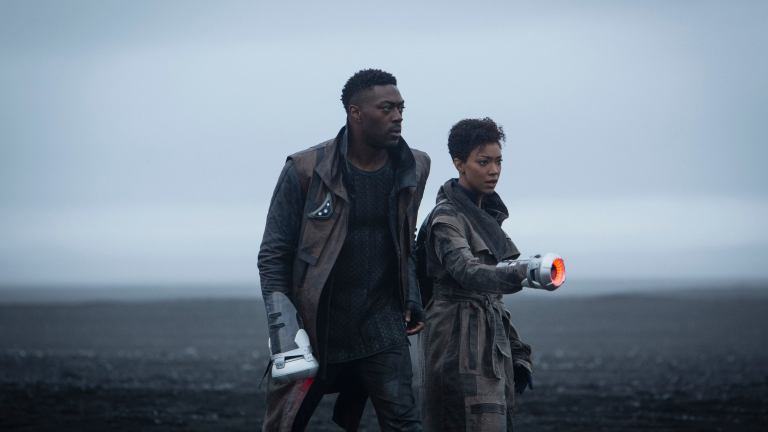Is The Star Trek Franchise Returning To The Original Series Format?
It’s been 15 years since the Star Trek franchise was actually focused on Star Trekking. Suddenly, everything seems to be going old school.

Some spoilers ahead for Star Trek: Discovery and Star Trek: Picard.
At the very beginning of the 1998 movie Star Trek: Insurrection, Captain Jean-Luc Picard jokingly asks, “Can anyone remember when we used to be explorers?” At the time, a lot of Trekkies chuckled uncomfortably in the theater. Over two decades later, the joke has become less funny.
There has been some excellent Star Trek since 1998, but how much of it has been about trekking through the stars? On some level, not since the cancellation of Star Trek: Enterprise in 2005 has the franchise directly explored the theme of well, exploration. But, suddenly, the entire Star Trek franchise seems ready to pivot back to its roots. The next three live-action iterations of Trek — Discovery season 3, Picard season 2, and the impending Strange New Worlds — are all poised to bring the Trek franchise into a format and style we haven’t seen in quite awhile.
To be clear, from where this writer sits, Star Trek in the 21st century has been fantastic. The reboot films brought a new, and much-needed approach to the classic characters, and demonstrated Star Trek’s potential to reach an audience beyond just the diehards. The first film also remains one of the best J.J. Abrams movies ever, and only gets better with time. Star Trek Beyond is a brilliant homage to The Original Series that makes you wish we had gotten more stories with the “Kelvin Universe” actors. As for Star Trek: Discovery and Star Trek: Picard, both series have boldly redefined Trek for the contemporary age of TV, creating unforgettable characters who thoughtfully expand the Star Trek pantheon. Plus, whether it’s a season-long arc or an individual episode, both Picard and Discovery are telling Star Trek stories. You can’t watch “Magic to Make the Sanest Man Go Mad” from season 1 of Discovery and somehow say that’s not “real” Star Trek. It is. Ditto with nearly all of Picard season 1.
So, don’t get me wrong. Star Trek is not broken. It is, however, different than it was in the heydays of the ‘90s. In some senses, Picard and Discovery have answered the question: “What if all Star Trek was like Deep Space Nine?” Which is to say: what if the shows were more about using the Star Trek ethos to explore stories of self-discovery and self-exploration? That said, there hasn’t been a lot of new space explored. And, although Discovery did meet a few new aliens (notably the Tardigrade in season 1), it’s not like the focus for that show has been about “seeking out new life and new civilizations.” But now, suddenly, all of Star Trek seems pointed back that way.
In the season 2 finale of Discovery — “Such Sweet Sorrow Part 2” — the ship jumps 930 years into the future. This has given the series a blank slate to explore the galaxy of Star Trek anew. The future, as we know, is another country, and with Discovery season 3, Michael Burnham and the crew will be in the greatest undiscovered country of all: a page of history that has yet to be written.
Interestingly, the season 1 finale of Picard is similar, at least, thematically. The ragtag crew of the La Sirena doesn’t leave the confines of their own place in spacetime, but there is a crew assembled, and they do appear to be boldly going…somewhere. Plus, Picard is set in 2399, the last year of the 24th century. But now, clearly, they’re heading into the 25th. The final frontier of the Picard era feels largely unexplored. We got a vague sense for what space was like near the areas where the Romulan neutral zone used to exist, but we don’t really know what the Beta Quadrant looks like. If the La Sirena is exploring the boundaries of known space in season 2, we might find out.
And then, of course, there’s Strange New Worlds, the unexpected in-development prequel series set aboard the USS Enterprise NCC-1701 under the command of Captain Christopher Pike. Already, the stars of the show — Anson Mount, Ethan Peck, and Rebecca Romijn — have hinted that this series will be a “hopeful” iteration of Trek, and the title of the series alone seems to directly imply that the Enterprise will be exploring “strange new worlds” on the five-year-mission that immediately preceded the one we saw on The Original Series. Of all the potential Trek has to return to its roots, Strange New Worlds is the most obvious one, of course, but that doesn’t mean the franchise hasn’t already been heading there.
From the Abrams-produced films, to Discovery, to Picard, the Star Trek of the 21st century seems to have strongly acknowledged that the stories of this hopeful future have to earn that hopefulness. On that front, Discovery certainly, in some ways, is the most honest Star Trek series in years — here’s a series about how the hopeful future of Trek gets created and maintained, or if you will, discovered. But now, even Discovery seems ready to tackle new horizons, rather than focus on the trials and tribulations of the past.
Some of it seems to be connected to the fact that nearly all these shows will be suddenly focused on main characters who have come to terms with some of their emotional demons. Michael Burnham ends season 2 of Discovery more hopeful than she’s been in a long time. Jean-Luc seems to ditch his emotional baggage by the end of season 1 of Picard. And, as far as Captain Pike, Spock, and Number One…well, we’ll see. Pike has some pretty hefty knowledge about his own future, but it’s possible that won’t make him depressed. Number One and Spock though? They seem like they’re doing great.
In any case, the message of all the new Star Trek coming in the future seems to be fixed on exploring the unknown. And after 15 years of soul-searching in the final frontier, it feels like the franchise has boldly earned the right to come back a little more hopeful.
What are you hoping for from upcoming Star Trek stories? Let us know in the comments below!
